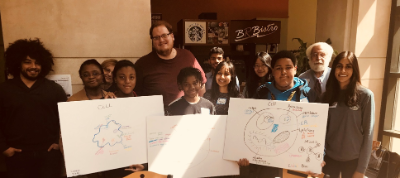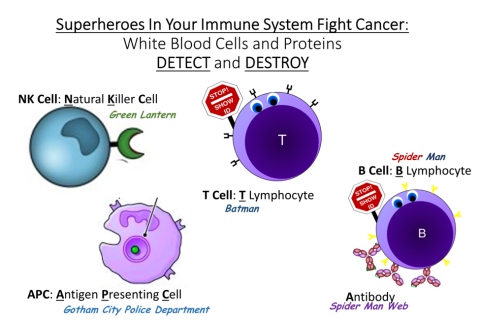On Saturday morning, April 7, a group of Bolton Middle School 7th grade students from the Cleveland Metropolitan School District came to the CWRU School of Medicine for a lively three-hour experience, "Learn to Beat Cancer," sponsored by the CWRU Center for Science, Health & Society and the Case Comprehensive Cancer Center. Designed and conducted by a group of medical and graduate students, the active, engaging and participatory learning program was kick-started with an upbeat welcome by Jessica Asirwatham, who likened the body's cellular composition to bricks used to build a wall. Sayuli Bhide, then used the "Draw It To Know It" approach to get students to construct cells and identify different sub-cellular organelles, following which Chandru Rasendran, got them to understand function by comparing each organelle to components of a school. Students identified the nucleus as the principal, the plasma membrane as the walls and security force, the lysosomes as janitors, the endoplasmic reticulum as the kitchen, the Golgi apparatus as the lunch line and the mitochondria as the boiler room - power plant. Jessica explained the process of DNA replication and the importance of message fidelity to maintain normal cell division and reproduction, following which, Xinrui Zhang, used the Telephone Message Whisper Game to illustrate distortion of message transmission as a metaphor for replication control going awry in cancer cells. For example, when she input the message "Two tiny toads ate fat flying flies," it came out after person to person whispered transmission as "A dude ate five flies."
Lunch saw spontaneous interaction between 7th graders, medical and graduate students who bonded over sandwiches and fruit while discussing their favorite TV shows. This activity provided the perfect segue for Nathaniel Robinson to discuss the many organs that can be affected by cancer and to review the hallmarks of cancer, starting with the need for cancer cells to establish a food supply leading to a description of angiogenesis. Together with Nathaniel, the students identified additional hallmarks of cancer, including uncontrolled growth, resistance to death, spread from one place to another and resistance to immune destruction.
This last hallmark was expanded by Dr. Folashade Otegbeye, who explained immune surveillance and anti-tumor immunity, by likening the immune cell repertoire to the Superheroes of the Justice League. She compared NK cells to the Green Lantern with his ability to generate a protective force field; APC cells as Gotham City Police focused on sending out alarm messages like the Bat Signal, B cells and their antibodies as Spiderman and his webs and T cells as Batman licensed to kill tumor cells. Dr. Otegbeye explained that while each Superhero has his/her own superpower, they are even more effective in destroying their foes when they band together. She was then able to clearly describe her research to overcome the cancer nemesis by increasing immune cell number and getting them to work synergistically. Jessica wrapped up by helping students dispel cancer myths and discussing healthy lifestyle issues and types of cancer treatment. Otis Pinkard conducted an evaluation that showed how much students thought the session was a rewarding and fun experience, which was even more emphatically demonstrated when the 7th graders asked the CWRU students to give them a tour of the Medical School. Every thousand mile journey starts with a single first step.
Faculty and staff helping students to develop this and subsequent programs include, Robert Haynie, MD, PhD, Associate Dean for Student Affairs; Lamont Davis, Bolton School Coordinator; Christina Keely, Program Administrator; Damian Junk, PhD, Assistant Director of Cancer Training & Education; Klara Papp, PhD, Vice Dean Medical Education; Folashade Otegbeye, MD; Monica Webb-Hooper, PhD; Cynthia Owusu, MD, MSC; Cancer Center Faculty; and Nathan A. Berger, MD, Principal Investigator of NCI-sponsored, Youth Engaged in Science grant.
For program information, contact us at cmk55@case.edu.



